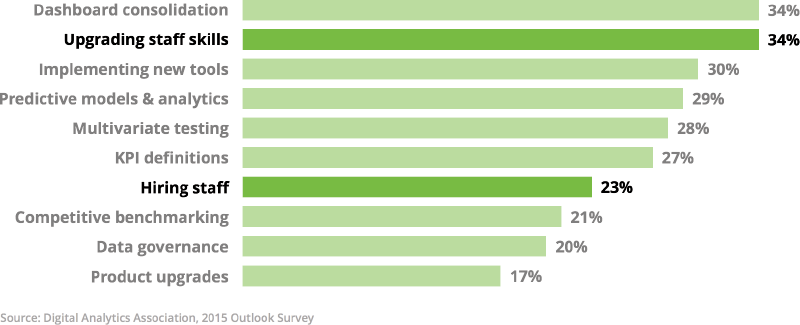Where is the industry at?
Careers and skills are a central issue within the digital analytics community today. The Digital Analytics Association’s 2015 Outlook Survey listed “upgrading staff skills” as the top initiative (along with “dashboard consolidation”) from their industry survey. Recruiting also made it into the top 10 and I’d guess that a lot of the other initiatives mentioned would be achieved with skills development (and more talented professionals available to hire).
What’s at the top of your list to develop your career in digital analytics?
Wow! I think that’s a difficult question to answer and I feel it stems from two things. Firstly, digital analytics has a diverse range of specialisations. In your digital analytics career you could be performing data analysis or you could be working on a highly technical implementation issue. There is no ‘one size fits all’ when it comes to what you can do within the field of digital analytics and as a result there is no predefined career path and no cookie-cutter educational track you can follow to reach your goals.
This really relates to the second challenge, that digital analytics is a young (maybe teenage) profession. This means that we’re only just starting to see careers mature and traditional education (think universities) catch up. This issue’s compounded by the fact that the field is rapidly evolving. This has a lot to do with the tools we’re using and new features that continually roll out. We can’t change this, but it’s important to account for it when you’re looking to develop your skills and your career.
Where do you fit in digital analytics?
Since there is such an incredible mix of possibilities when it comes to your individual career in digital analytics, it’s best to take a top-level view of what you’re currently doing and more importantly, what you want to be doing.
Start by considering where you fit. Are you more into technical implementation, looking after marketing initiatives or supporting business functions? You might even be a mix of two or all of these core digital analytics functions.
Next, it’s time to get more detailed about your area of specialisation. I’ve developed these five core focus areas as a starting point, but you can adjust these as needed.
- Collection
- Reporting
- Manipulation
- Analysis
- Presentation
You can now use this to benchmark where you are currently (and where you want to be in the future). Here are some examples of people in different focus areas:
Once you’ve established what you're currently doing and what you want to be doing (these might be different or might be the same as each other) you can begin to use the framework to map out a plan for your career and skills development.
Digital Analytics Career Framework
I’ve created the Digital Analytics Career Framework so you can plan out the steps in your own career development. The basic concept is that there are four blocks or modules that you can use and reorder based on where you’re currently at with your career.
Here’s a quick overview of the modules:
- Play is about allocating time to test and fail. For example, you might make time to play with a new digital analytics tool that you haven’t used before or you might try doing something crazy like measuring coffee or movement.
- Learn is about committing to digital analytics education. This could be a formal education program (think university), reading a book (shameless plug for my book), taking a training course, reading blog posts or attending an industry event.
- Mentor is about either finding a mentor (if you are starting out) or being a mentor (if you are more established in your career). I’d recommend being able to talk to your mentor, however you don’t necessarily need to meet them, you could use them as a career role model.
- Refresh is about coming up to speed on what’s new (like learning about a new technique) and about repeating the framework.
Putting it all together
Now you can use the following matrix which combines the Digital Analytics Career Framework with the digital analytics focus areas. This allows you to pinpoint your career priorities and provide you with a concise to-do list.
The completed matrix above gives priority to allocating time to play with presentation. This now guides your career development – you could allocate time to play with a new data visualisation technique, experiment with a radically new dashboard or write a piece of analysis. The critical thing is to focus on playing – it needs to be something new and you can’t worry about the business outcomes. You need to make time to truly play.
Then you can move on to the next priority. In our example it’s learning about data manipulation. This could be finding an online course about combining multiple data sets.
It’s all about figuring out where you are, where you want to be and making the time to fit in your top priorities. I’d love to hear about your progress in your digital analytics career!








